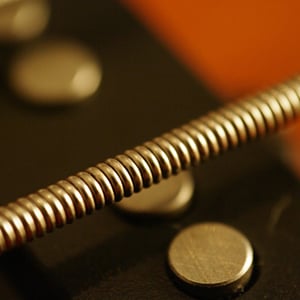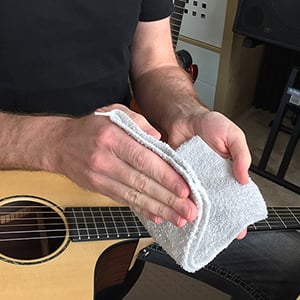- Home
- Instruments
- Gear
- Recording
- Lessons
- Reviews
- Blog

No matter what type of guitar you won, your choice of strings will dictate the way that guitar sounds. The scope of this impact differs a lot depending on whether you have an acoustic or an electric guitar.
Since acoustic guitars rely on the soundbox and strings to create sound, you are essentially having to deal with a lot more unknowns, all of which take extra time to figure out.
Check our dedicated piece on choosing guitar strings How to Choose Guitar Strings For Acoustic Guitars for more information on this subject. When it comes to electric guitars, things are much more relaxed. Sure, the gauge is still a big factor, but you don't have to worry as much about the material of the strings. Speaking of which.
Your standard guitar string is going to have a steel core that is then wrapped with another layer thin wire. This outer material can be a lot of things. We're talking steel, brass, aluminum, bronze or others. Which one of these choices is the best for you will depend on what type of tone you are after, and how comfortable you are playing that specific set of strings.
When it comes to electric guitars, finding the right string gauge is 95% of the job. Contrary to popular belief, lighter strings are not there to strictly provide more comfort. They are actually a lot easier to work with in a number of different ways.
Same as always, the genre of music you're interested in and your playing style will be a major factor when deciding which gauge of strings you want to try out. If you play something like blues or rock, a lighter gauge will be more than enough, plus you can express yourself a lot easier with ‘softer' strings.
On the other hand, those who play metal are going to be searching for a good set of heavy gauge strings. In this specific scenario, heavier gauge strings will give your tone a lot more girth. Just to add to the topic before we move on, even the lighter gauge strings can be made to sound heavy.
That is a lesson Billy Gibbons learned after 30 plus years of plying guitar. With a bit of tweaking, you can fine tune that heavy tone even with a set of light gauge soft strings.
That being said, guitar string manufacturers went out of their way to meet the needs of the market. A very choice of string gauge for those who play more aggressive genres of music is to get a set which has lowest three strings in heavy gauge, while the higher three are from a light gauge set.
This way you get best of both worlds without having to buy two different sets. Those softer higher strings are great for solos or similar ‘clinical' work, while the heavier gauge low strings pack all the tone necessary for hard driving rhythms.
Check out our list of recommended guitar strings, and find out which models are currently the most promising ones.
 As times goes by and you use your guitar often, the strings will slowly start to lose some of their sonic properties. As soon as this happens, you will want to change them for a brand new set. This is best seen on electric guitars. When you have an old set of strings on an electric guitar, your tone will become dull and muddy.
As times goes by and you use your guitar often, the strings will slowly start to lose some of their sonic properties. As soon as this happens, you will want to change them for a brand new set. This is best seen on electric guitars. When you have an old set of strings on an electric guitar, your tone will become dull and muddy.
Changing your strings in a timely manner will ensure that you always get the best performance from your guitar. On a similar note, if you plan on recording music, you will definitely want to change the strings before you enter the recording studio.
This is among the most common rookie mistakes. Sound engineering has come pretty far at this point, but there is only so much ironing that can be done to a track.
 Guitar string maintenance is fairly simple and straight forward. One of the biggest enemies of guitar strings is sweat. Moisture and metal don't mix very well, and corrosion is a real issue. If you play on stage a lot, you will start to sweat, most of which will go straight to your guitar.
Guitar string maintenance is fairly simple and straight forward. One of the biggest enemies of guitar strings is sweat. Moisture and metal don't mix very well, and corrosion is a real issue. If you play on stage a lot, you will start to sweat, most of which will go straight to your guitar.
Even if you use sweat bands, there is going to be more than enough sweat on your fretboard once you're done. The easiest way to reduce the risk of corrosion is to wipe the guitar down with a towel after every performance. This way you will eliminate any extra sweat, and give your strings a chance to have a much longer life span,
At the end of the day, finding the right set of strings is going to take some time. You will probably go through a variety of different models before you find something that works best for you. This process is among the rare ones where trial and error is still the most effective way of going about solving the issue of guitar strings.
Once you figure out which set you like the most, you will definitely want to have at least one whole extra set somewhere. No matter how strong the manufacturer says their product is, guitar strings break. When that happens, you will want to have a backup set with you just in case. One is the bare minimum, while some guitar players have even more.

Reader Interactions